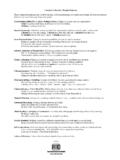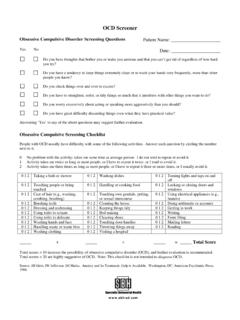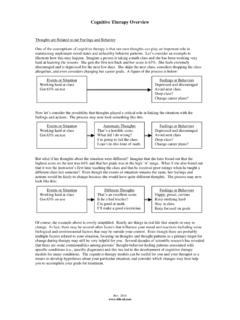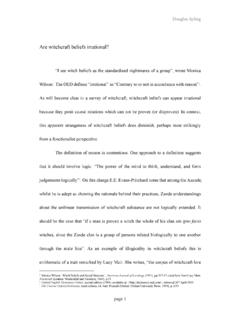Transcription of Irrational, Distorted, and Pessimistic Thinking Patterns
1 Common irrational , distorted , and Pessimistic Thinking Patterns These thought Patterns often keep us stuck in self-defeating or ineffective behavior Patterns and make us unhappy. Perfectionism, Either/Or, or All or Nothing Thinking : Failing to see gray areas or compromises. I must be perfect at all things at all times, or else I m a failure. Nothing is working out for me. Should Statements: Unnecessarily criticizing yourself, others, or the world. I should have seen that coming. I should have done that different. I shouldn t feel this way. He should treat me with more respect.
2 I should get paid more. Over-Personalization: Taking too much responsibility for your or other s situations. Failing to consider role of environment (including other people) in a tough situation. Trying to fix other people s problems. Believing other people s criticisms are the truth rather than an opinion. Selective Attention or Mental Filter: Minimizing positives and focusing instead on perceived negatives. The A on that paper means nothing. The instructor was an easy grader. I handled that situation horribly. It was a complete disaster. Denial or Blaming: Failing to accurately recognize your own role or capabilities in a situation. Trying to do too many things at once.
3 Always being late or missing deadlines. Telling self that you re helpless or hopeless in response to what life dishes out. Blaming others for your lack of efforts. False-permanence: Thinking things are more permanent than they really are. Not forgiving self for mistakes I ll never live this down. Failing to remember that negative situations will let up or ever get better. Over-generalizing or Labeling: A single event falsely becomes generalized to a larger pattern. My boyfriend broke up with I guess I m not marriage material. Labeling self as idiot, failure, loser, downer, ugly, lazy, or a depressive. Catastrophizing or Can t-Stand-Its: Making things out to be worse than they really are (often to avoid them).
4 Failing to also consider positive outcomes as possibilities. Telling self that negative past, present, or future event is worse than really is. Magical Thinking : Telling self everything would be better if I wealthier, taller, thinner, better looking, etc. Emotional Reasoning: Acting as though emotions are reality. I don t feel motivated, so I don t get out of bed. He didn t like my performance, so it must have been lousy. Mind-Reading or Jumping to Conclusions: Assuming what other people are Thinking without really knowing. He doesn t really care. She didn t want to date me because she thought I was dorky. Double Standard: Holding yourself to a different standard than you would apply to a good friend.
5 Being especially hard on yourself and not cutting yourself the same breaks you afford others. Self-Centeredness: Over focusing on self and ignoring how events relate to others, world, or spiritual universe. I was so nervous meeting him. All I could think of was saying the wrong thing. I can t go to the party. I ll look fat in this dress. Fallacy of Fairness: Falsely believing things should always work out fairly. 2003













